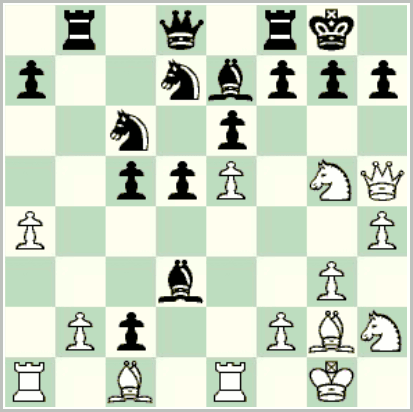“BritBase is back!“, announces John Saunders on his blog. He clarifies that it never went away: rather he hadn’t been updating it for a couple of years, but now has restarted doing so.
Among the first few new items on the “What’s New” page there are two containing games by Irish players: the British championship subsidiary events in 1967 and 1968, with three games of Nick Patterson from the 1967 British U21 championship, and four of John Moles from the 1968 British U21.
 The eventful game Kendall-Patterson, British U21 championship 1967 reached the diagrammed position. Play continued 16. Re4 h6 17. Ng4 dxe4 18. Nxe6 e3 19. Nxd8 Bg6 20. Nxh6+ gxh6 21. Qe2 Nxd8 22. Qxe3 Re8 23. Qc3 and Black won fairly quickly.
The eventful game Kendall-Patterson, British U21 championship 1967 reached the diagrammed position. Play continued 16. Re4 h6 17. Ng4 dxe4 18. Nxe6 e3 19. Nxd8 Bg6 20. Nxh6+ gxh6 21. Qe2 Nxd8 22. Qxe3 Re8 23. Qc3 and Black won fairly quickly.
In truth White has nothing in the diagrammed position. Nevertheless in the critical sequence above Black made some serious errors that could have resulted in a less favourable outcome. Where, and how could White have taken advantage? (Answer in a couple of days.)
There were several other Irish players in the 1968 championships at least: an Irish Times article from August 10, 1968 (p. 8) describes the progress of David Wilson, William Collins, and Michael Harkness (all Belfast) and Edward Lewis (Dublin) in the British Boys U16 championship, and Peter O’Kane, Martyn Matthews, Alan White, and Brian Ruderman (all Belfast) in the British Boys U18 championship, but none of their games appear in the BritBase collection. However the 1967 BritBase file has a game of “DC Wilson” from that year’s British Boys U16. Is this David Wilson of Belfast who played in the same competition the following year?

I’m reasonably confident that a trawl of the Belfast and/or Dublin newspapers for 1967 would provide the definitive answer, but I can confirm that David Wilson’s initials were DC.
The answer to the question posed in the post: 17. … hxg5 would have been vastly simpler. Engines find the move played something like 10 pawns worse, though still winning (!).
Later 19. … Nxd8 is winning, but after the game’s 19. …B g6?? White could have turned the tables via 20. Qxg6! fxg6 21. Nxc6, when it’s White who has the decisive advantage.